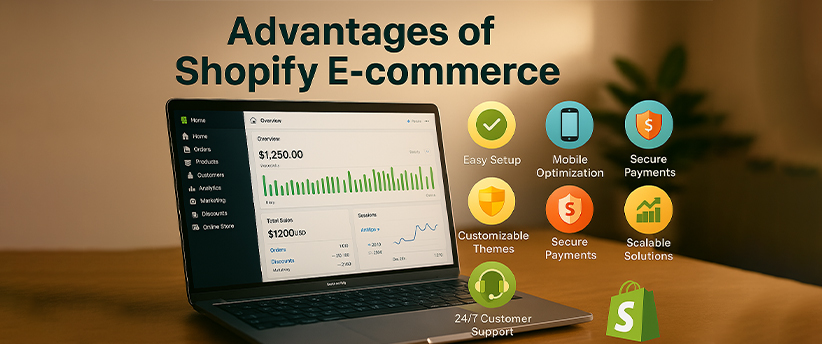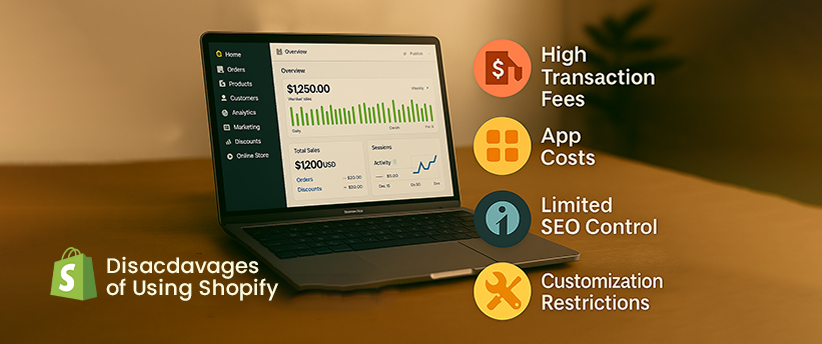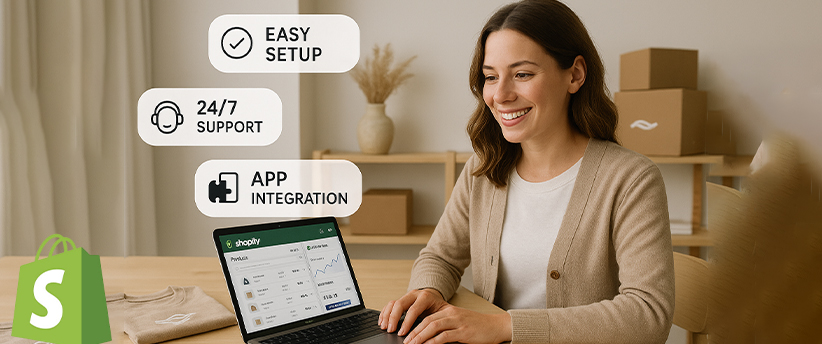Is Shopify Good for Ecommerce Website? [Pros and Cons]
![Is Shopify Good for Ecommerce Website? [Pros and Cons] Is Shopify Good for Ecommerce Website? [Pros and Cons]](/_next/image?url=https%3A%2F%2Fwww.indianwebsitecompany.com%2Fimages%2F1751009322520_Is-Shopify-Good-for-Ecommerce-Website-Pros-and-Cons.jpg&w=3840&q=75)
Shopify has become among the most significant online stores platforms in the world and has equipped millions of other stores. It is a Software-as-a-Service (SaaS) platform which is basically a fully hosted and managed platform that allows you to create build, run and scale an online business and it delivers exactly all the tools you require to do this. Shopify presents an interesting opportunity to many hopeful businesspersons and running companies.
Nevertheless, similar to any other platform it has a number of pros and cons. Knowing these would enable you to find out whether Shopify can perfectly serve your eCommerce web design requirements.
Advantages of Shopify E-commerce
Relatively simple and fast assemblage:
User-Friendly Interface: Shopify has a user-friendly dashboard, which is really simple to maneuver by anyone with or without technical skills, so as to establish an online store. You need not be a programmer to have a good-looking site set up.
Single platform: Shopify is a hosted platform which means that all the technical stuff is taken care of: hosting, security (SSL certificates, PCI compliance), software and maintenance. This implies that you do not need to deal with the issues of server maintenance, backup and patching of holes not to mention that you spend your time thinking entirely about your business.
Waterfall Start: You also have the ability to open up your store, select a couple of themes, add items and make a sale within hours or days, not the usual weeks or even months. This rapid speed of market is very beneficial to either a new business or the one that wants to test ideas at a fast pace.
Powerful Feature and Scalable:
Advanced Features: Shopify is equipped with all the important e-commerce capabilities by default, such as product setting, inventory management, create orders, customer management, coupons, simple analytics, and different sales channels (web store, social selling, marketplaces, point-of-sale).
Scalability: Shopify scales with your business. Whether it's small startups or big businesses (Shopify Plus), the platform is able to handle growing traffic, product lists, and sales volumes without slowing down. No need to fear server crashes during flash sales.
Global Reach: It is multi-currency, multi-language, and international shipping enabled, making it simple to take your business global.
Extensive App Store (Functionality Expansion):
Huge Ecosystem: The Shopify App Store contains thousands of free and paid apps (plugins) that expand your store's capabilities. Want advanced email marketing, dropshipping integrations, loyalty programs, better SEO tools, subscription services, or customer service automation? There's probably an app for that.
Seamless Integration: Apps tend to be well-integrated and simple to install, usually with a few clicks from your Shopify admin panel.
Specialized Solutions: Several apps service a particular industry or business model, delivering customized solutions that would otherwise demand custom development.
Great Security and Dependability:
Managed Security: Shopify is PCI DSS Level 1 certified, providing the best possible standards for payment card industry data security. It supports intrinsic SSL certificates, strong fraud detection, and always-on threat monitoring. You do not need to deal with these sophisticated security features yourself.
High Uptime: Shopify has outstanding uptime rates (usually 99.99% or better), so your shop is nearly always open to shoppers, reducing lost sales caused by downtime.
Managed Hosting: Their cloud architecture ensures quick loading times and consistent performance across the world.
Solid Customer Support and Tools:
24/7 Support: Shopify has 24/7 customer support through live chat, email, and phone, which is priceless when you have problems, particularly during peak sales time.
Extensive Documentation: They offer a thorough help center, guides, and an active community forum where you can discover solutions to frequently asked questions and receive peer assistance.
Shopify Experts: A team of qualified Shopify experts and partners (many ecommerce website design firm professionals among them) are for hire offering specialized design, development, marketing, and strategic guidance.
Integrated Payment Processing (Shopify Payments):
Simplicity: Shopify Payments enables you to take credit card payments directly without a third-party gateway, keeping setup and reconciliation simple.
Lower Transaction Fees: Shopify imposes transaction fees on third-party payment gateways, but they are eliminated if you utilize Shopify Payments (although normal credit card processing charges remain applicable).
Disadvantages of Using Shopify for E-commerce
Monthly Subscription Fees and Transaction Fees:
Recurring Expenses: Shopify is a subscription-model service, and you pay a monthly subscription fee (Basic Shopify, Shopify, Advanced Shopify, Shopify Plus) independent of your volume of sales. The fees can mount up, particularly as you scale up to more advanced plans for additional features.
Transaction Fees (third-party gateway): If you opt out of Shopify Payments and decide to use an external payment gateway, Shopify will charge an extra transaction fee (e.g., 2.0% on the Basic plan, which scales down with higher plans) in addition to your payment gateway's fees. This can have a considerable impact on your profit margins.
App Fees: Most free apps are available, but the strongest and most specialized apps tend to have their own monthly fees that can greatly add to your overall expenses.
Limitations in Customization (versus Open-Source):
Theme-Dependent Design: Although Shopify has plenty of themes available (free and paid), customization occurs more within the theme's control panel or using the Liquid templating language. In-depth, from-the-ground-up customization that basically reconfigures the core behavior of the platform may be difficult or require extremely specialized development.
Less Code Control: You lack direct access to the server or control over the underlying code like you would with an open-source solution such as WordPress/WooCommerce or Magento. That implies you are limited to what Shopify supports through its API and theme development features.
Vendor Lock-in: Exiting Shopify might be more difficult than transferring an open-source site since your data and functionalities are locked into their proprietary environment.
SEO Can Be Difficult (for Power Users):
Shopify automatically manages many technical SEO details (SSL, sitemaps), but some advanced SEO customizations are less intuitive than they would be with open-source platforms providing finer-grained control (e.g., explicit server settings, advanced custom redirects).
Heavily depending on apps for SEO functionality can sometimes create problems if not handled precisely.
Few Free Features on Base Plans:
The basic plans have decent core functionality, but advanced features (such as advanced reporting, third-party calculated shipping rates, international pricing, or improved staff accounts) are behind higher-priced plans (Shopify, Advanced Shopify, or Plus). This compels companies to scale up as they expand, adding expenses.
No Email Hosting:
Shopify doesn't include email hosting. You'll need a third-party provider (such as Google Workspace, Zoho Mail, or your domain registrar) for business email addresses.
When is Shopify a Good Option for E-commerce?
You value ease of use and rapid time to market: If you need to get up and running in a hurry and don't want to be bogged down with technicalities.
You appreciate a managed, secure, and stable platform: If you don't want to bother with hosting, security patches, or server upkeep.
You're okay with recurring monthly payments: And you accept the possible effect of transaction fees (particularly if not utilizing Shopify Payments) and app fees.
You have some budget for a paid theme or top-of-the-line apps to gain certain functionalities.
You require great customer support and an enormous network of integrations.
You're going to grow fast and need a solid infrastructure.
Conclusion
Shopify is a very powerful and easy-to-use platform that makes eCommerce site building possible for a wide range of people. Its hosted all-in-one solution, solid feature set, large app store, and great support make it a perfect solution for companies seeking a quick, secure, and scalable online store without the technical hassles of self-hosted solutions. Yet, its subscription pricing, transaction charges (unless using Shopify Payments), and some of the customization constraints are considerations to balance very carefully. For companies in need of a deeply customized brand experience or multiple integrations, tapping into the capabilities of an eCommerce website design firm can realize the full potential of Shopify, making your online store not only functional, but exceptional and ready for sustained success.
Hire a Shopify Development Company in India
Looking for an affordable and reliable company to build your Shopify eCommerce store? Connect with Indian Website Company, a leading Shopify eCommerce development company in India. We specialize in delivering customized Shopify website design and development services tailored to your business needs all at competitive prices.
Recent Blogs

11 Reason Why Mobile App Development is Important for Your Business in 2024

Things to Consider Before Hiring a Website Developer



